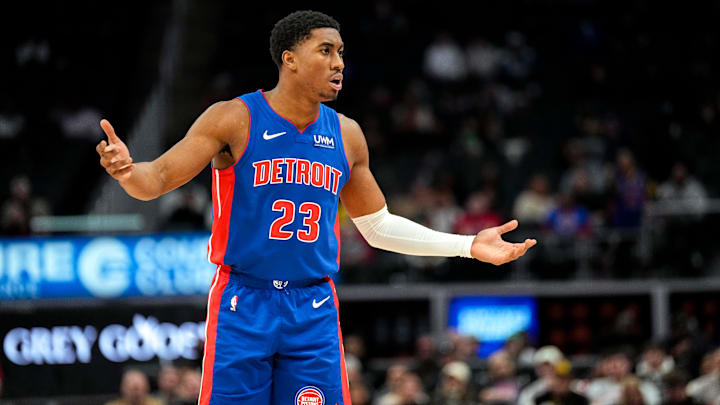Jaden Ivey’s contract extension is one of the Detroit Pistons’ biggest current questions. Both Ivey and Duren are eligible for extensions until October, but the Pistons have a better sense of what Duren brings to the table and can continue to provide. Due to poor timing with his season-ending injury last season, Ivey is much less of a known commodity, which could lead the Pistons to offer him a shorter contract like the Rockets did with Jalen Green.
Pistons could go the Jalen Green route with Jaden Ivey
One unconventional option for Ivey’s contract extension could follow the example set last season by former #2 overall pick Jalen Green. After rounds of tough negotiations with the Rockets, Green eventually signed to a 2+1 deal (2 years guaranteed with an additional year on a player option) for a total of $106 million. This is the first rookie extension worth at least $100 million total with a player option, and was intended to give Green a chance to prove himself for a bigger contract down the road.
This type of contract is very different from the usual rookie contract extensions - such as Cade Cunningham’s 5-year/$269 million or Jalen Suggs’ 5-year/$150 million (perhaps more equivalent to Ivey in terms of impact). But the Rockets were very uncertain of what they had with Green, who had shown some absolutely brilliant flashes - including a March stretch averaging 30 points over 11 games in the season before inking his deal - but struggled to be consistent.
Ivey doesn’t have quite as drastic ups and downs as Green did in Houston, but he does sadly have a pretty small sample size (only played 30 games last season) with the rest of the young core in its current configuration. He did show growth in the right direction last season, increasing his scoring to 17 points a game and improving his 3-point shooting to over 40 percent, but the Pistons likely want to see more before offering him a huge contract.
Ivey was also putting together a phenomenal stretch before getting injured. In his last five games before injury, he averaged 19 points a game while shooting nearly 60 percent from the field and an incredible 61 percent (!!) from three on five attempts a game. Of course, these numbers are not sustainable over an entire season but they could point to more growth in the future.
It’s unlikely that the Pistons will get a lot more information on Ivey’s true long-term value by the end of October, so the best bet for both sides could be extending him on a shorter deal with a potential player option. If Ivey outperforms that contract, he can opt out and sign a longer, more lucrative extension before too long. But if he doesn’t reach superstar status, the Pistons can have him on a more affordable deal and lock him up after an accurate assessment of his value.
